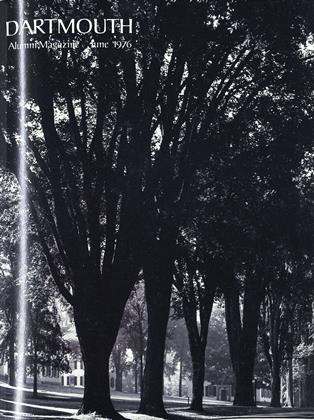SHELBY GRANTHAM has never met either Dartmouth senior, but she likes Mary Ellen Donovan and isn't so sure about Douglas Allen Dame.
Grantham, the Hanover resident whose calligraphy appeared on every Dartmouth diploma this spring, loves beautiful letters and, by her own admission, feels her heart leap when she sees a perfectly drawn letter. She thinks Mary Ellen Donovan has a prettier name than Douglas Allen Dame because Donovan's name "sits right" and Dame's does not.
" 'Douglas Allen Dame' isn't as nice," she says, explaining that the combination of the capital A and the double l in Dame's middle name is awkward. "All three letters are tall," she says, "and there's a space between the slanted A and the upright l's."
Those kinds of distinctions come from the fine eye of a woman who completed about 700 diplomas in three weeks during the month of May. A Mississippi native who used to work as a printer in Woodstock, Vermont, Grantham calls herself "one of those people for whom the shape of letters is important."
Grantham keeps farm hours, rising in the early morning and beginning her work on the diplomas by 5:45. She works during the day at Wagner Woodlands, a forest management firm in Lyme, and spends another hour or two in the evening with her pen and ink. Abhorring the flawed letter and the crooked line, she meticulously aligns the diploma, counts the number of letters in each student's name for spacing, and sculpts her stately letters onto the parchment.
When she's "fresh and not bone-weary" she can do about 40 diplomas without having to do one over. "When the error-free run breaks, however, it's liable to do so with a bang, and I'll misspell four in a row," she says. Sometimes she gets exasperated and misspells the same name several times in a row. Errors "breed each other."
"One has to check constantly about spelling," she says. "There are a thousand ways to spell the commonest names." Time pressure and weariness increase the likelihood of spelling errors. Occasionally she has to do a diploma over again if she guesses wrong on spacing or if she sees a letter "that really hurts."
Grantham works closely with Alva Lombardo of the Dean's office, who gathers the information she needs for the diplomas and checks the spelling of students' names one last time before they are given to President Kemeny for his signature.
Year-round operation has affected the lives of calligraphers as well as of students and College personnel, for diplomas are now granted regularly four times a year. Though they are numerous and must be done under great pressure, the June diplomas are actually the easiest to complete - mainly because there are so many they are delivered already imprinted with the date. She has to add the month in Latin and the year in Roman numerals on diplomas issued after the summer, fall, and winter terms, and that addition requires a time-consuming change of pen.
Recipients of honorary degrees from the College get diplomas printed on actual sheepskin. "That's fascinating work to do." Grantham says. "There's a whole different technique involved because the sheepskin is oily and the ink won't take unless you apply a white powdery substance on it first."
The size, the cost, and the value of a Dartmouth diploma have varied over two centuries. The early Presidents of the College presented students with bills that were smaller than today's but with diplomas that were larger. The early sheepskin diplomas were completely handwriţen. Some had irregular shapes and each had its own distinctive flair.
Grantham began doing calligraphy for the College only recently. Gerald Wheeler did the work for several years before another local resident, Sue Bridge, took on the task. Bridge asked Grantham if she would lend a hand with the calligraphy for both the Dartmouth matriculation certificates and the diplomas. Now Bridge is in Boston doing technical drawing and Grantham is doing this batch of the calligraphy alone.
"It's a lot of pressure," she says, "because there isn't a lot of time. The list of the names for the diplomas came late ... it would have made things a lot easier if they had come earlier." Despite the pressure, Grantham does each diploma with care and pride. "I try very hard to think how I felt when I got diplomas," she says. "I know people like to see their name in pretty letters. So I try to do it well."
 View Full Issue
View Full Issue
More From This Issue
-
 Feature
FeatureA four-and -a-half-ounce magic totem pole
June 1976 By NORMAN MACLEAN -
 Feature
FeatureTHE OLD ROMAN SPEAKS TO US STILL
June 1976 By DAVID SHRIBMAN -
 Feature
Feature231 Years for Dartmouth
June 1976 -
 Feature
FeatureCommencement
June 1976 By JAMES L. FARLEY -
 Article
ArticleCollege with an Upper-case "C"
June 1976 -
 Class Notes
Class Notes1959
June 1976 By DOUGLAS WISE
D.M.S.
-
 Article
ArticleFresh Man in Washington
November 1975 By D.M.S. -
 Article
ArticleWe're All Right, Jack
December 1975 By D.M.S. -
 Article
ArticleMan of a Thousand Hats (more or less)
February 1976 By D.M.S. -
 Article
ArticleLife wifi Emma
March 1976 By D.M.S. -
 Article
ArticleRescuing an Elephant on Wheels
March 1976 By D.M.S. -
 Article
ArticleIndependence Seeker
May 1976 By D.M.S.








